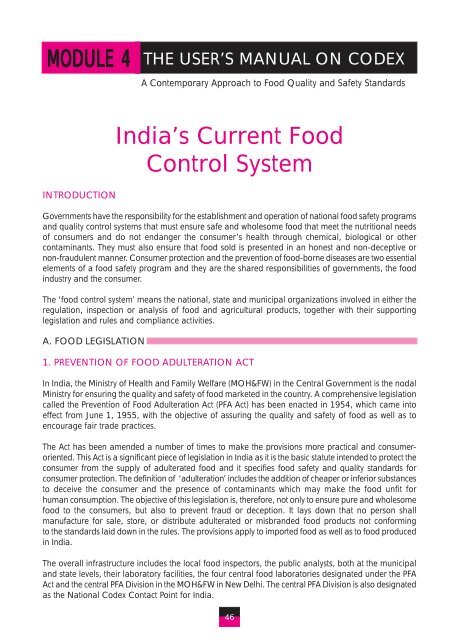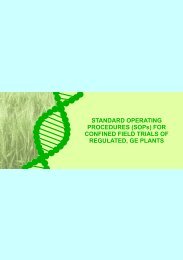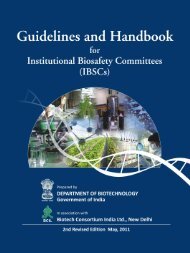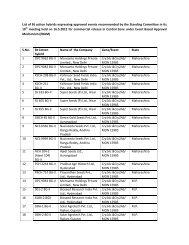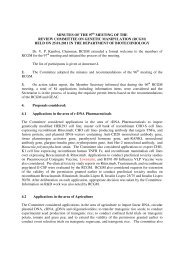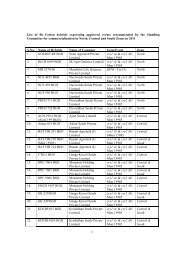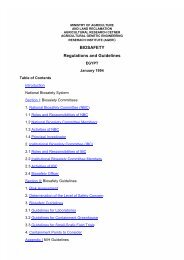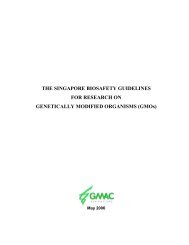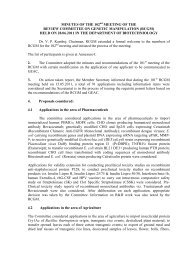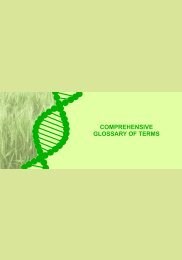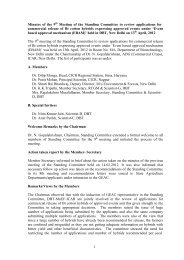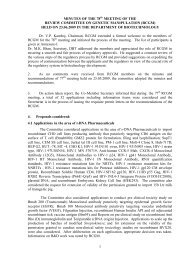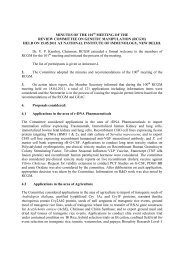THE USER'S MANUAL ON CODEX - Department of Biotechnology
THE USER'S MANUAL ON CODEX - Department of Biotechnology
THE USER'S MANUAL ON CODEX - Department of Biotechnology
Create successful ePaper yourself
Turn your PDF publications into a flip-book with our unique Google optimized e-Paper software.
MODULE 4<br />
<strong>THE</strong> USER’S <strong>MANUAL</strong> <strong>ON</strong> <strong>CODEX</strong><br />
A Contemporary Approach to Food Quality and Safety Standards<br />
INTRODUCTI<strong>ON</strong><br />
India’s Current Food<br />
Control System<br />
Governments have the responsibility for the establishment and operation <strong>of</strong> national food safety programs<br />
and quality control systems that must ensure safe and wholesome food that meet the nutritional needs<br />
<strong>of</strong> consumers and do not endanger the consumer’s health through chemical, biological or other<br />
contaminants. They must also ensure that food sold is presented in an honest and non-deceptive or<br />
non-fraudulent manner. Consumer protection and the prevention <strong>of</strong> food-borne diseases are two essential<br />
elements <strong>of</strong> a food safety program and they are the shared responsibilities <strong>of</strong> governments, the food<br />
industry and the consumer.<br />
The ‘food control system’ means the national, state and municipal organizations involved in either the<br />
regulation, inspection or analysis <strong>of</strong> food and agricultural products, together with their supporting<br />
legislation and rules and compliance activities.<br />
A. FOOD LEGISLATI<strong>ON</strong><br />
1. PREVENTI<strong>ON</strong> OF FOOD ADULTERATI<strong>ON</strong> ACT<br />
In India, the Ministry <strong>of</strong> Health and Family Welfare (MOH&FW) in the Central Government is the nodal<br />
Ministry for ensuring the quality and safety <strong>of</strong> food marketed in the country. A comprehensive legislation<br />
called the Prevention <strong>of</strong> Food Adulteration Act (PFA Act) has been enacted in 1954, which came into<br />
effect from June 1, 1955, with the objective <strong>of</strong> assuring the quality and safety <strong>of</strong> food as well as to<br />
encourage fair trade practices.<br />
The Act has been amended a number <strong>of</strong> times to make the provisions more practical and consumeroriented.<br />
This Act is a significant piece <strong>of</strong> legislation in India as it is the basic statute intended to protect the<br />
consumer from the supply <strong>of</strong> adulterated food and it specifies food safety and quality standards for<br />
consumer protection. The definition <strong>of</strong> ‘adulteration’ includes the addition <strong>of</strong> cheaper or inferior substances<br />
to deceive the consumer and the presence <strong>of</strong> contaminants which may make the food unfit for<br />
human consumption. The objective <strong>of</strong> this legislation is, therefore, not only to ensure pure and wholesome<br />
food to the consumers, but also to prevent fraud or deception. It lays down that no person shall<br />
manufacture for sale, store, or distribute adulterated or misbranded food products not conforming<br />
to the standards laid down in the rules. The provisions apply to imported food as well as to food produced<br />
in India.<br />
The overall infrastructure includes the local food inspectors, the public analysts, both at the municipal<br />
and state levels, their laboratory facilities, the four central food laboratories designated under the PFA<br />
Act and the central PFA Division in the MOH&FW in New Delhi. The central PFA Division is also designated<br />
as the National Codex Contact Point for India.<br />
46


